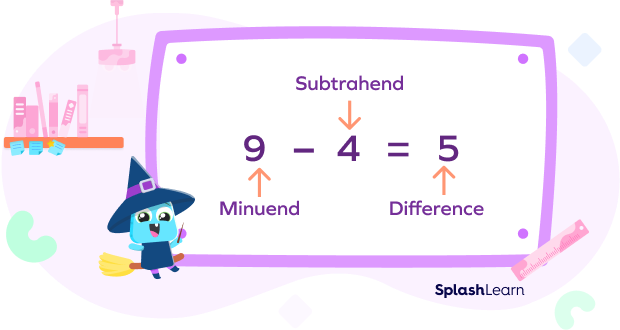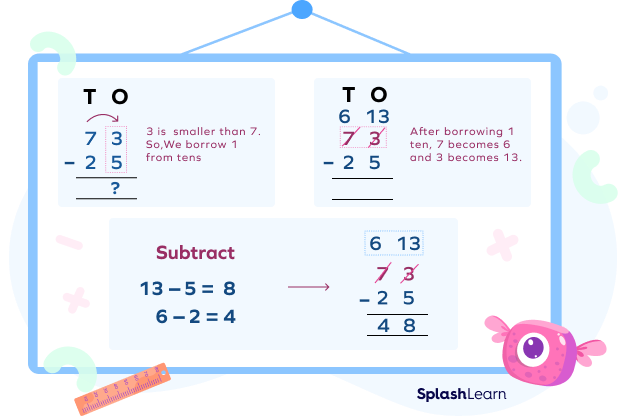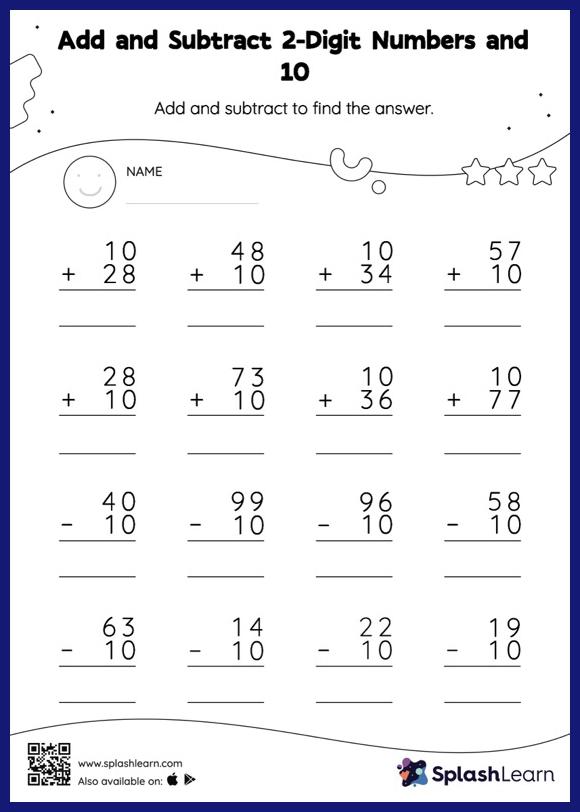The minuend is the starting point of a subtraction operation. It is an essential part of a subtraction equation.
Suppose you have to subtract 5 from 8. You can easily write it as:

But can you say which one of these numbers is the minuend? Well, it is the number 8.
Come, let us know more about meaning of minuends.
What is Minuend in Math?
Minuend is defined as the number in a subtraction sentence from which we subtract another number. A subtraction sentence consists of 3 numbers: minuend, subtrahend, and difference.
The minuend is the first number in a subtraction sentence. We subtract subtrahend from the minuend to get the difference.

Let us consider the subtraction equation 9 – 4 = 5.
Here,

In the vertical method of subtraction or column method, the minuend is the number at the top.

In the column method of subtraction, we regroup the numbers if the minuend digit is smaller than the subtrahend digit. That is, the digit we want to subtract is higher than the digit from which it is subtracted. In such a case, we borrow 1 from the next higher place to regroup the numbers. It makes the value of the minuend digit higher than the subtrahend digit and makes it possible to subtract the subtrahend digit from the minuend digit.

Here, 5 cannot be subtracted from 3. So, 1 ten is borrowed from the tens place. This changes the minuend digit from 3 to 13. Now, 5 can be easily subtracted from 13 to get 8.
Recommended Games
Application of Minuend in Real Life
Having a clear concept of minuend will enable you to carry out subtraction operations easily and quickly. For instance, when you buy something at a store, knowing this concept well will help you easily calculate how much money you are left with.
Recommended Worksheets
Fun Facts
- The word “minuend” originates from the Latin word “minuendus,” which means something that will decrease.
- In a subtraction sentence, the value of the minuend is equal to the sum of the subtrahend and the difference. For example, if ___ – 7 = 28, then the minuend is 28 + 7 = 35.
Conclusion
Subtraction is one of the four fundamental operations of mathematics. Mastering this operation and its vocabulary is essential for understanding algebra and other mathematical operations. SplashLearn can help you learn the concepts and vocabulary of subtraction with ease. This learning platform has lessons with plenty of examples and practice problems to resolve your doubts on minuend.
Solved Examples
Example 1: Which is the minuend in the subtraction equation given below?
762 – 436 = 326
Solution: 762. We know that the first number in a subtraction sentence is a minuend. So, here 762 is the minuend.
Example 2: Find the minuend in 500 – 499.
Solution: 500. According to the definition of minuend, it is the number from which another number is deducted or subtracted. Thus, 500 is the minuend here.
Example 3: Find the value of 83 – 36 using the column method.
Solution: 47. On arranging the numbers in the column method by place value, we observe that the minuend, 3, in the ones column is smaller than the subtrahend, 6, in the ones column. So, we borrow 1 from the tens place for the minuend 3 and regroup the numbers. This increases the minuend value to 13 and makes it greater than the subtrahend 6. We then carry out the subtraction operation and get 83 – 36 = 47.

Practice Problems
Minuend - Definition With Examples
In the equation x – y = z, which is the minuend?
Explanation: In a subtraction equation, minuend is the number from which another number is subtracted. In equation x – y = z, we have to subtract y from x. So, x is the minuend.
Nina has 92 cupcakes. She gives 48 cupcakes to Nora. How many cupcakes is Nina left with?
We arrange the numbers in the column method by place value. Here, the minuend 2 in the ones column is smaller than the subtrahend 8 in the ones column. So, we borrow 1 from the tens place for minuend 2 and regroup the numbers. This increases the minuend value to 12 and makes it greater than the subtrahend 8. We then carry out the subtraction operation and get 92 – 48 = 44.

If you subtract 293 from 365, what number will you get?
We arrange the numbers in the column method by place value. Here, the minuend 6 in the tens place is smaller than the subtrahend 9 in the tens place. So, we borrow 1 from the hundreds place for minuend 6 and regroup the numbers. This increases the minuend value to 16 and makes it greater than the subtrahend 9. We then carry out the subtraction operation and get 365 – 293 = 72.

Frequently Asked Questions
When arranging a subtraction problem in the column method, does the minuend always sit above the subtrahend?
Yes, when a subtraction problem is arranged in the column method, the minuend always sits above the subtrahend.
What do we get if we subtract the difference from the minuend?
We get the subtrahend if we subtract the difference from the minuend.
When can we carry out subtraction without regrouping?
We can do subtraction without regrouping if we don’t have to borrow any number from the preceding digit.




































